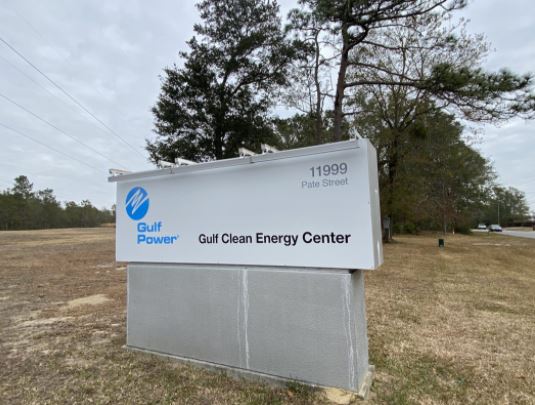
Plant Crist, which was converted from coal to natural gas, has been renamed Gulf Clean Energy Center to commemorate a new chapter as a cleaner generating plant.
The conversion is part of the recently merged Florida Power & Light Company and Gulf Power’s commitment to investing in cleaner energy while ensuring long-term reliability and lower costs for customers through lower operating costs and increased generation.
“Plant Crist has been a powerful force in our region for 75 years, generating power that has supported our communities and sustained economic growth across the Panhandle,” said Marlene Santos, Gulf Power president. “We’re honored to be able to continue that legacy by modernizing the plant to be able to continue to serve Northwest Florida as Gulf Clean Energy Center, delivering greater reliability, lower operating costs and cleaner emissions as we meet the ever-increasing energy needs of our customers well into the future.”
Converting the coal-burning units to run on natural gas is a major piece of the modernization underway at the plant, along with the addition of four new, highly efficient combustion turbines to provide greater reliability and efficiency for the energy grid and a new natural gas pipeline to provide additional natural gas for the plant. By eliminating the use of coal, Gulf Clean Energy Center carbon emission rates will be reduced by 40% – the equivalent to taking an estimated 297,000 cars off the road annually – and reduce operating costs for customers.
In addition to cleaner energy, the modernization projects provide economic benefits to Escambia County, with approximately $125 million in additional tax revenues expected over the operating life of the projects as well as additional economic benefits from the purchasing of local goods and services during construction.
End of coal-fired power generation in Florida for FPL
Gulf Power is a part of Florida Power & Light Company, which announced last week that it formally closed its last coal-fired plant in Florida at the end of 2020. FPL purchased the Indiantown Cogeneration plant, located in Martin County, in 2017 for the sole purpose of shutting it down and saving customers money. The Indiantown plant retirement, along with the modernization of Gulf Power’s plant in Pensacola, mark the end of coal in FPL’s power plant operations.
“As part of FPL, the largest generator of solar in Florida and one of the largest in the nation, we are continuing the company’s clean energy legacy by transforming the way that we generate power for Northwest Florida,” added Santos.
Investing in cleaner energy solutions
Gulf Power is committed to providing clean, reliable energy and lowering costs for our customers while enhancing the reliability of the electric grid. The reopening of the Gulf Clean Energy Center as a natural gas power plant is a key milestone in Gulf Power’s clean energy future.
In addition, as part of FPL, Gulf Power is working to make Northwest Florida a leader in clean, solar energy that keeps costs down for customers and keeps the region beautiful. It’s all part of FPL’s plan to install 30 million solar panels throughout all of Florida by 2030, positioning Florida as a solar leader.
Northwest Florida’s solar expansion includes:
- The Blue Indigo Solar Energy Center in Jackson County, which began serving customers last spring and is capable of generating enough renewable energy to power 15,000 homes.
- Construction will begin on two more solar energy centers this spring, the Cotton Creek Solar Energy Center in Escambia County and the Blue Springs Solar Energy Center in Jackson County.
- Multiple additional solar farms are in the early phases of development, including First City Solar Energy Center in North Escambia County; Blackwater River Solar Energy Center in Santa Rosa County; Chautauqua Solar Energy Center in Walton County; Chipola River Solar Energy Center and Flowers Creek Solar Energy Center in Calhoun County; and Apalachee Solar Energy Center in Jackson County.
Greater visibility of working solar technology is coming to Northwest Florida communities with the installation of solar trees and car canopies. The first two solar trees are being installed in Pensacola on the corner of Main and Reus streets at the Wahoo stadium crosswalk, with additional installations popping up in other popular spots in Pensacola, Fort Walton Beach and Destin.





































